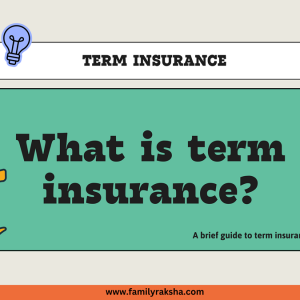Term insurance, also known as term life insurance, is a type of life insurance policy that provides coverage for a specified period, known as the “term.” If the insured person passes away during the term of the policy, a death benefit is paid out to the beneficiaries designated by the policyholder.
Key Features of Term Insurance:
Temporary Coverage: Unlike permanent life insurance policies (such as whole life or universal life insurance), term insurance offers coverage for a specific duration, which can range from 5 to 30 years or more. If the insured person survives the term, the policy typically expires without any payout or cash value.
Death Benefit: The primary purpose of term insurance is to provide financial protection to the insured’s beneficiaries in the event of their death during the policy term. The death benefit is the amount paid to the beneficiaries and is usually a tax-free lump sum.
Affordable Premiums: Term insurance is generally more affordable than permanent life insurance because it does not build cash value and has no investment component. As a result, it is a popular choice for individuals seeking straightforward life insurance coverage without additional savings features.
Renewable and Convertible Options: Some term insurance policies offer renewal options, allowing the insured to extend the coverage beyond the initial term, often at higher premiums. Additionally, many policies come with a conversion feature that permits the policyholder to convert the term policy into a permanent life insurance policy without the need for a medical exam.
No Cash Value: Term insurance does not accumulate cash value over time, as opposed to permanent life insurance policies, which build a cash reserve that the policyholder can access or borrow against.
Flexible Coverage Amount: Policyholders can choose the coverage amount (death benefit) they need based on their financial responsibilities and beneficiaries’ needs.
Simplicity: Term insurance is relatively easy to understand, making it a straightforward choice for many individuals looking for basic life insurance coverage.
Term insurance is suitable for various scenarios, such as providing income replacement for dependents, paying off debts (e.g., mortgages), funding children’s education, or securing financial obligations during a specific period.
Finding the right term insurance plan is crucial for ensuring financial security for your loved ones in case of any unfortunate event.
Here are some tips to help you compare term insurance plans and make an informed decision:
Coverage Amount: Assess your financial needs and responsibilities, such as outstanding loans, future expenses (education, marriage), and daily living costs. Choose a coverage amount that adequately meets these needs.
Policy Duration: Term insurance plans come with different policy durations (e.g., 10, 20, or 30 years). Select a term that aligns with your financial obligations and the time until your dependents become financially independent.
Premiums: Compare premium costs for the coverage amount and duration you need. Choose a premium that fits your budget, but remember that the cheapest plan may not always provide the best coverage.
Riders and Add-ons: Check if the insurance company offers any additional riders or add-ons, such as critical illness cover, accidental death benefit, or disability rider. Evaluate whether you need these extras and how they impact the overall cost.
Claim Settlement Ratio: Research the claim settlement ratio of different insurance companies. A higher ratio indicates that the company is more likely to settle claims promptly and efficiently.
Company Reputation: Look for insurance providers with a good reputation for customer service, financial stability, and a proven track record of honoring claims.
Exclusions: Carefully read and understand the policy exclusions, i.e., the situations in which the insurance company will not pay out the sum assured. Ensure that you are comfortable with these terms.
Online Reviews and Feedback: Read customer reviews and feedback to get an idea of other policyholders’ experiences with the insurance company and their claim settlement process.
Flexibility and Convertibility: Check if the term insurance plan allows for any flexibility or conversion options. Some plans may allow you to increase the coverage or convert the term policy into a permanent life insurance policy later.
Underwriting Process: Understand the underwriting process and how it may affect the policy issuance. Some insurers have simplified underwriting, making it quicker and more convenient to get the coverage you need.
Surrender Value: If you think there’s a possibility you might terminate the policy before its term, check if the policy offers any surrender value.
Online Tools and Calculators: Utilize online premium calculators and comparison tools offered by insurance companies to get customized quotes and make comparisons more manageable.
Professional Advice: If you’re unsure about the best policy for your specific situation, consider seeking advice from a certified financial planner or insurance advisor.
The right term insurance plan for you depends on your individual circumstances, financial goals, and risk tolerance. Take your time to research and compare different policies before making a decision. It’s essential to assess your financial needs, consider the term duration, and choose an appropriate coverage amount when purchasing term insurance to ensure your loved one’s financial well-being in case of any unforeseen circumstances.
Read more articles at Family Raksha!





